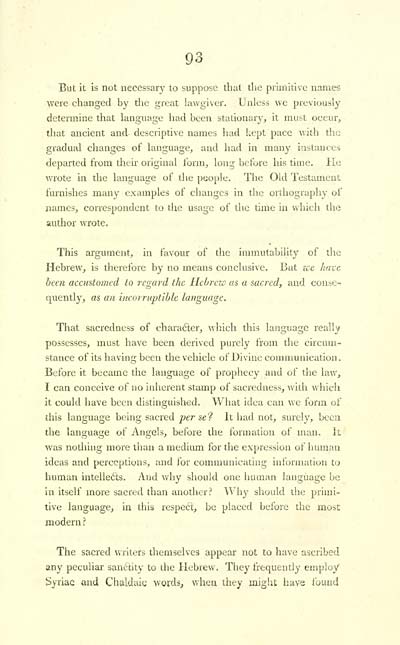Blair Collection > Celtic researches, on the origin, traditions & language, of the ancient Britons
(183)
Download files
Complete book:
Individual page:
Thumbnail gallery: Grid view | List view

93
But it is not necessary to suppose that tlie primitive names
were changed by the great hivvgiver. Unless we previously
determine that langaiage had been stationary, it must occur,
that ancient and descriptive names liad kept pace \vith the
gradual changes of language, and had in many instances
departed from their original form, long before his time. He
Avrote in the language of the people. The Old Testament
furnishes many examples of changes in the orthography of
names, correspondent to the usage of the time in which the
author wrote.
This argument, in favour of the immutability of the
Hebrew, is therefore by no means conclusive. But zee have
been accustomed ίο regard the Hcbrezo as a sacred, and conae-
quently, as an incorruptihk language.
That sacredness of charatìer, which this language really
possesses, must have been derived purely from the circum-
stance of its having been the vehicle of Divine comnmnication.
Before it became the language of prophecy and of the law,
I can conceive of no inherent stamp of sacredness, with which
it could have been distinguished. What idea can we form of
this language being sacred per se ì It had not, surely, been
the language of Angels, before the formation of man. It
was nothing more than a medium for the expression of human
ideas and perceptions, and for communicating information to
human intelleéìs. And why should one human language be
in itself more sacred than another i* Why should the primi-
tive language, in this respeéì, be placed before the most
modern ?
The sacred writers themselves appear not to have ascribed
any peculiar sanétity to the Hebrew. They frequently employ
%riac and Chaldidc words, when they might have found
But it is not necessary to suppose that tlie primitive names
were changed by the great hivvgiver. Unless we previously
determine that langaiage had been stationary, it must occur,
that ancient and descriptive names liad kept pace \vith the
gradual changes of language, and had in many instances
departed from their original form, long before his time. He
Avrote in the language of the people. The Old Testament
furnishes many examples of changes in the orthography of
names, correspondent to the usage of the time in which the
author wrote.
This argument, in favour of the immutability of the
Hebrew, is therefore by no means conclusive. But zee have
been accustomed ίο regard the Hcbrezo as a sacred, and conae-
quently, as an incorruptihk language.
That sacredness of charatìer, which this language really
possesses, must have been derived purely from the circum-
stance of its having been the vehicle of Divine comnmnication.
Before it became the language of prophecy and of the law,
I can conceive of no inherent stamp of sacredness, with which
it could have been distinguished. What idea can we form of
this language being sacred per se ì It had not, surely, been
the language of Angels, before the formation of man. It
was nothing more than a medium for the expression of human
ideas and perceptions, and for communicating information to
human intelleéìs. And why should one human language be
in itself more sacred than another i* Why should the primi-
tive language, in this respeéì, be placed before the most
modern ?
The sacred writers themselves appear not to have ascribed
any peculiar sanétity to the Hebrew. They frequently employ
%riac and Chaldidc words, when they might have found
Set display mode to: Large image | Transcription
Images and transcriptions on this page, including medium image downloads, may be used under the Creative Commons Attribution 4.0 International Licence unless otherwise stated. ![]()
| Early Gaelic Book Collections > Blair Collection > Celtic researches, on the origin, traditions & language, of the ancient Britons > (183) |
|---|
| Permanent URL | https://digital.nls.uk/75765894 |
|---|
| Description | A selection of books from a collection of more than 500 titles, mostly on religious and literary topics. Also includes some material dealing with other Celtic languages and societies. Collection created towards the end of the 19th century by Lady Evelyn Stewart Murray. |
|---|
| Description | Selected items from five 'Special and Named Printed Collections'. Includes books in Gaelic and other Celtic languages, works about the Gaels, their languages, literature, culture and history. |
|---|

